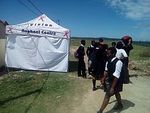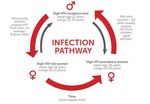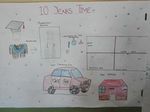Khanya 2020-2021 - Raphael Centre
←
→
Page content transcription
If your browser does not render page correctly, please read the page content below
Khanya 2020-2021
The title - Khanya is a Xhosa name for a boy or a girl and means: “Be bright”. It is used to describe something positive, such
as a bright future, shining like a diamond, or being brave.
Background: The Makana Municipal District is home to 120 000 residents, of whom up to 80% are unemployed. The
overwhelming majority of them are adolescents. Unemployment, inequality and poverty have been defined as the triple
challenge in our area. Poverty is traumatising and has led to symptoms of social and physical ill-health and dependency
cycles of women from an early age. In 2016, there was estimated that one-third of teenage girls (aged between 15 and 19)
was pregnant in South Africa (SANAC, 2016). The Sarah Baartman District, which Makhanda is part of, has the earliest sexual
debut of girls (from the age of 12 years). There is a critical drop-out trend to be found among youth over the age of 14 with
60 % leaving school before reaching grade 12 (DG Murray Trust/ Hartnack 2017). Gender-based violence and
intergenerational intimate relationships of older men with girls, young women and young men against gifts and money are
precarious reality. They are considered to be the driving factors of HIV transmission among young people in South Africa. In
particular, young women and girls are disproportionally affected until today. A recent report by the South African National
AIDS Council says that there are 1,200 new infections among 15-24 years old girls and young women every week (SANAC,
2020).
Khanya Aims and Approach: To intervene in these cycles of early dependency we use
assertiveness and consciousness building approaches. We
know that some of the root causes are economic distress at
home, the quest for belonging, and among youth peer-
dynamics. ‘Khanya’ activities aim at fostering emotional
and economic resilience. The project composition is unique
in the field as it links skills development workshops with
story-telling activities to understand the contexts of social
& economic empowerment and reproductive and sexual
health rights. All our activities use strength-based and
solution-orientated models. With ‘strength-based’ we refer
to a specific way of community engagement which is called
‘Asset-based Citizen-driven Development’ (ABCD). It
emphasizes and uncovers individual strengths (assets), links
them with opportunities and builds change from there. Its
consciousness building and appreciative processes have
proven to foster positive and pro-active behaviour,
SANAC, 2017: page 14 independency thinking, confidence and personal growth.An essential element for personal well-being is resilience. And, important ingredients of resilience are confidence in
personal strengths and capabilities, emotional intelligence, awareness about healthy social support networks,
perspectives, the capability to make realistic plans as well as taking the necessary steps to follow them through.
Partners 2020 and 2021:
We work with Highschools and local NGOs which offer afterschool-programmes in Grahamstown. Both link us to the peer-
networks of the Siya Sonke youth and adults. The Siya Sonke partners are 35 families who live in the Joza community in
Makhanda (Grahamstown). The institutions we seek to work with this coming project cycle are:
Ikamva Youth Project in Grahamstown (30 learners)
Upstart Youth in Grahamstown (20 learners)
Khutliso Daniels Secondary School (350 learners)
Nombulelo Secondary School (300 learners)
Young out-of-school women and women:
Thabiso Life Skills participants - Assumption Development Centre (30)
Local women activist groups (20)
In process: collaboration with Rhodes University Critical Studies in Sexualities and Reproduction. The aims are that
academic research will become more praxis-relevant but also to include academic work into the Khanya’s theory of
change.
Activities 2020 When
Persona-Doll storytelling workshops: Intergenerational and transactional relationships, pregnancy and
HIV October to
December 2020
Interactive story-telling and problem-solving in groups: to stimulate empathy with a main
character who goes through different narratives of HIV-exposure, infection and early
motherhood. Also, this is to comprehend early cycles of dependency and its’ consequences, and
the students elaborate on alternative life choice. Furthermore, it emphasizes the importance of
peer-support.
HIV: ‘Scanning’ what youth knows about HIV and other STIs, clarify questions and to fix myths.
Sexual and Reproductive Health Rights introduction, discussion and sharing flyers for guidance
to access them.
Introductions:
ABCD introductions and training to build consciousness about personal capacities, independency and
becoming the ‘first creator’ of life plans. October &
December 2020,
ABCD paradigm and man characteristics of the strength-based approach (e.g. leadership and
peer-support/ social cohesion).
Circle of courage (inventory of personal strengths)
Envisioning future (long term goal) and basic knowledge in project planning and budgeting.
Leadership Camp:
December
With Siya Sonke youth
Leadership skills (meaning of leadership, components of leadership, team-building, visioning,
planning & budgeting, public speaking)Activities 2021 When
Persona-Doll storytelling workshops: Intergenerational and transactional relationships, pregnancy
and HIV
Interactive story-telling and problem-solving in groups: to stimulate empathy with a main
April to May
character who goes through different narratives of HIV-exposure, infection and early
motherhood. Also, this is to comprehend early cycles of dependency and its’ consequences, 2021
and the students elaborate on alternative life choice. Furthermore, it emphasizes the
importance of peer-support.
HIV: ‘Scanning’ what youth knows about HIV and other STIs, clarify questions and to fix
myths.
Sexual and Reproductive Health Rights introduction, discussion and sharing flyers for
guidance to access them.
ABCD introductions and training to build consciousness about personal capacities, independency
and becoming the ‘first creator’ of life plans. Introductions:
April-May 2021
ABCD paradigm and man characteristics of the strength-based approach (e.g. leadership and
peer-support/ social cohesion). Training:
Circle of courage (inventory of personal strengths) September 2021
Envisioning future (long term goal) and basic knowledge in project planning and budgeting.
School projects run by students
Workshop (5 days) : Reproductive and Sexual Health Rights
With local High School youth March 2021
Siya Sonke youth
Topics covered: Prevention, care and treatment of STI’s/ treatment of reproductive tract
infections/ Family Planning and Contraceptives/ Safe and unsafe abortions/ Early diagnosis of
breast and cervical cancer/ forced marriage (ukutwala)/ healthy relationships/ Early
pregnancy/ Lesbian, Gay, Transgender and Bisexual (LGTB)/ Violence against women/
Women’s Rights Activism)
Peer Faciliation (Education Training) for Khanya:
May 2021
With local High School youth
Siya Sonke youth
Sexual & Reproductive Health Rights and Youth Well-being in Grahamstown: Youth Debate
November 2021
In assistance of Rhodes University Debating Society (16 days of
With local High School youth
activism)
3 Workshops (each 4 days): Organisational Development Skills (focus lies upon leadership, how to
form citizen-driven associations and entrepreneurial/ business/ project development and
management skills) February 2021
With local out-of-school young women
Women April 2021
Topics covered: contexts of economic independency and participation, project development,
planning, management and budgeting, forms of associations, team-building June 2021
Leadership Camp:
December
With Siya Sonke youth and Khanya champions 2020/ 2021
Planning Khanya 2022
Team-building and outdoor activitiesCurrent Khanya Co-investors 2020 and 2021:
The DG Murray Trust
Scottish Episcopal Church Mission Association
Budget 2020-2021
Training Material (stationary, printing, 4,500 Rand
workshop packs)
Educational Material (books, journals) 2,800 Rand
Equipment (data projector, screen) 7,000 Rand
Meals/ Refreshments for workshops 8,500 Rand
Facilitation 32,500 Rand
Transport 1,800 Rand
Communication 1,600 Rand
Leadership Camp 1 (transport, 24,000 Rand
accommodation, food)
Leadership Camp 2 (transport, 24,000 Rand
accommodation, food)
Indirect admin costs 10,670 Rand
Total 117,370 Rand
Income
Co-investment, funding 28,620 Rand
Individual donations 4,250
Balance required 88,750 RandYou can also read
























































